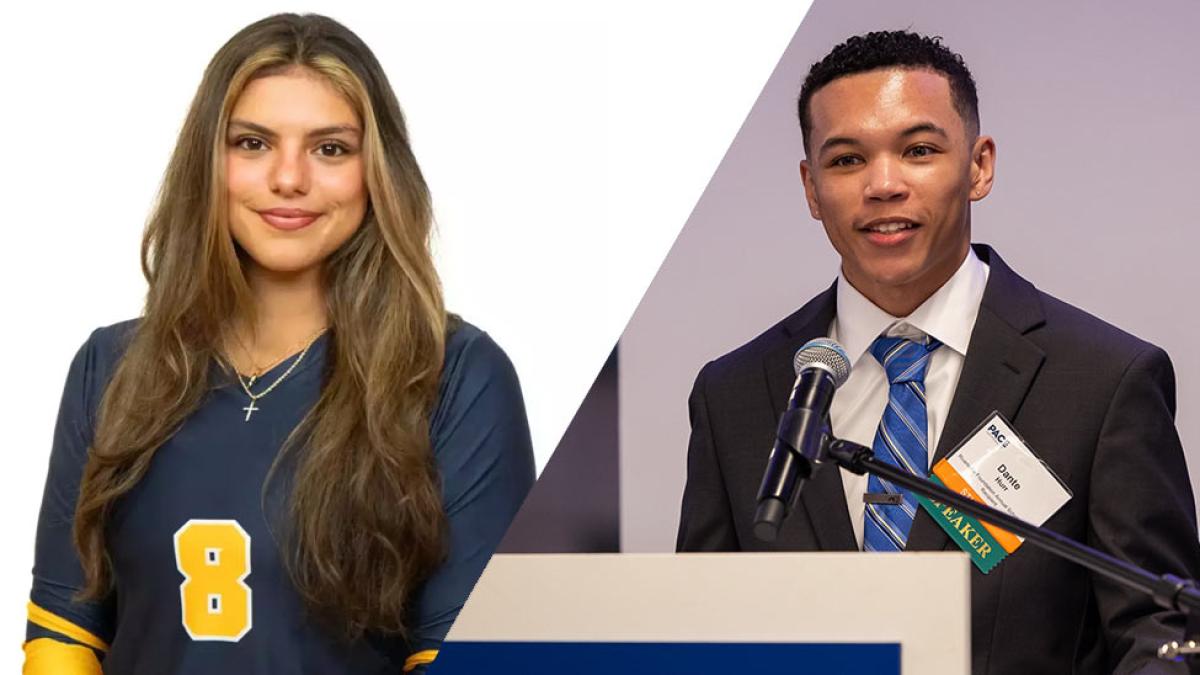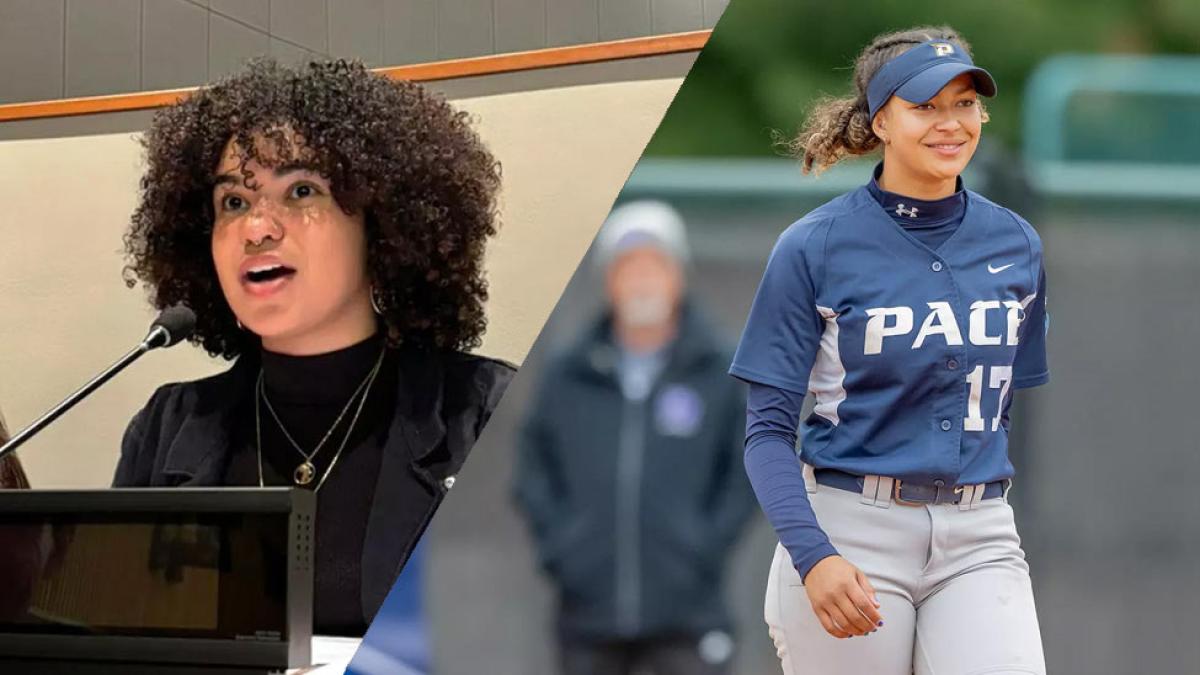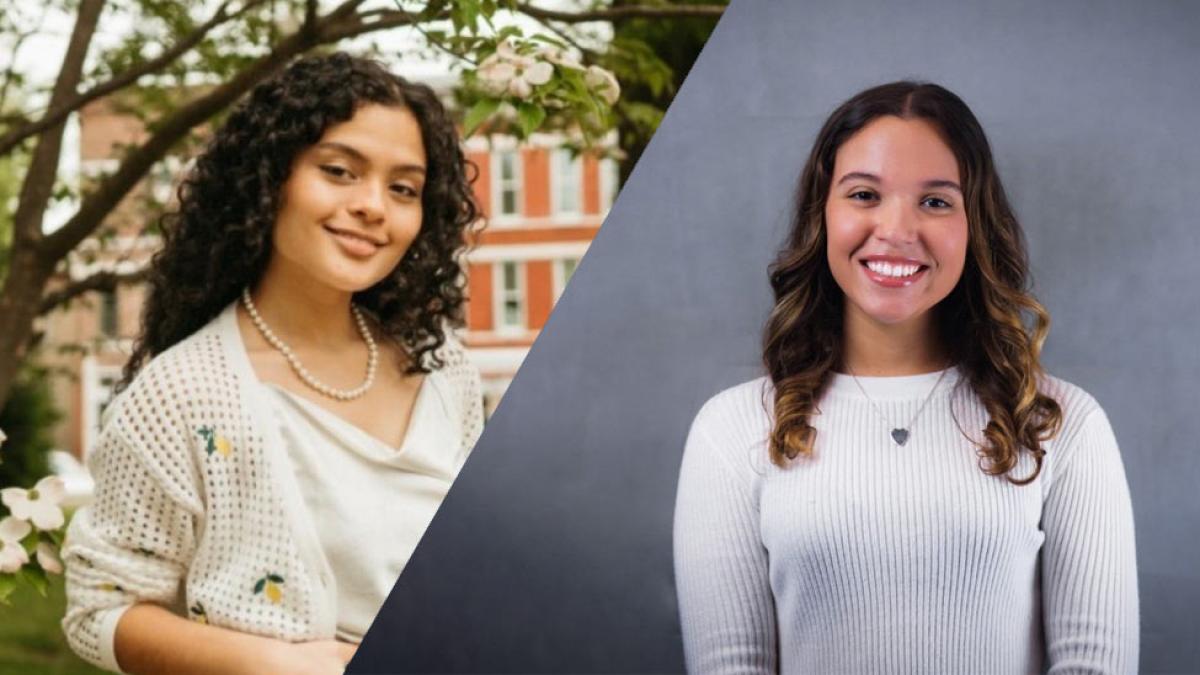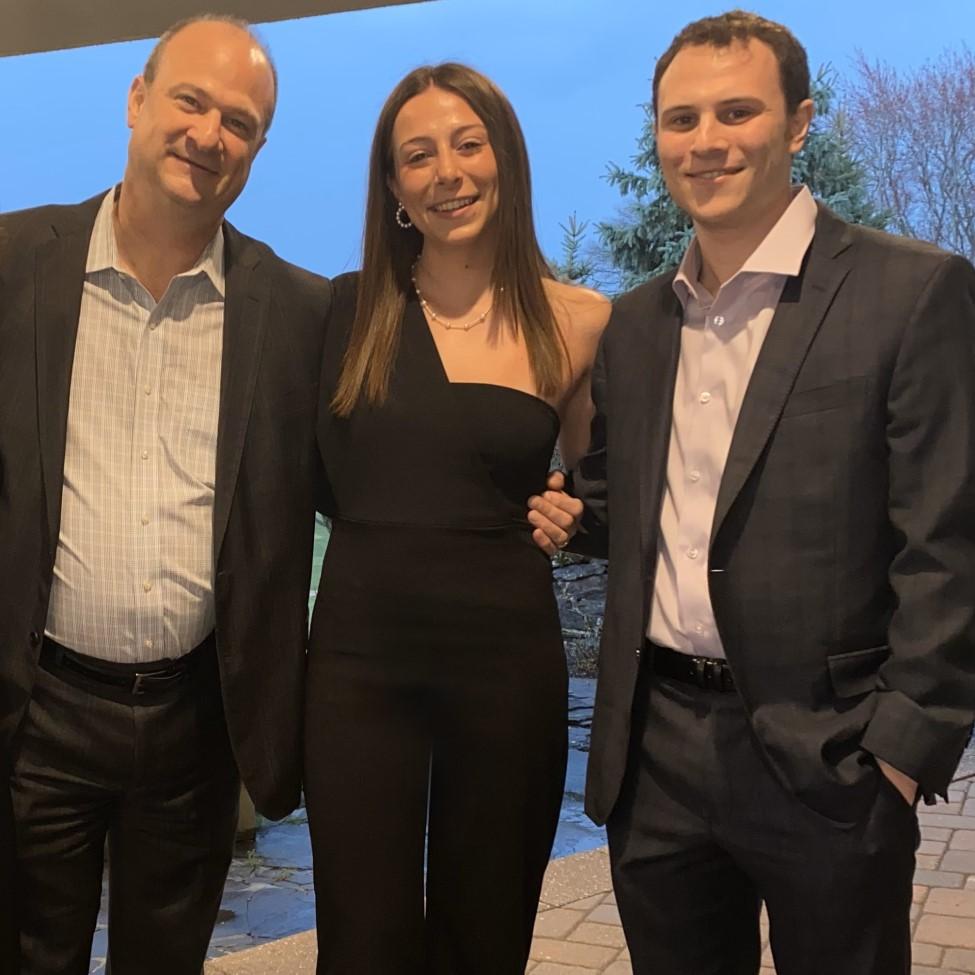
Etsy CEO: People Who Make These 2 Early Career Moves Become More Successful Than Most
Etsy CEO Josh Silverman shared two key decisions that shaped his early career during a recent keynote address as highlighted by CNBC.
Graduating Law School Students Enter Career At Uncertain Moment
AMNY notes that Pace University’s Commencement joined other New York law institutions in marking the season with nods to resilience and change.
Anjali Sud to Pace Grads: “Be You,” Draws on Indian Heritage
India West recaps a powerful message from Tubi CEO Anjali Sud, who addressed graduates of the Seidenberg School of Computer Science and Information Systems, urging them to embrace authenticity, optimism, and meaningful impact.
Etsy’s CEO Shares Two Key Steps He Took Early In His Career That Set Him Up For Later Success
Fortune spotlights Etsy CEO Josh Silverman, who revealed two pivotal steps that helped shape his early career during a keynote address.
A Legal Legacy: Emma Churgin ’27, Hunter Churgin ’24, and Joseph Churgin ‘93
When Joseph Churgin graduated from the Elisabeth Haub School of Law at Pace University in 1993, he never could have imagined that 32 years later, two of his children would not only be studying law but attending the same law school. “I felt incredibly proud that both Hunter and Emma wanted to attend law school where I got my start,” shared Joseph. “It was the perfect fit for me, and I hoped that it would be for both of my children as well.”
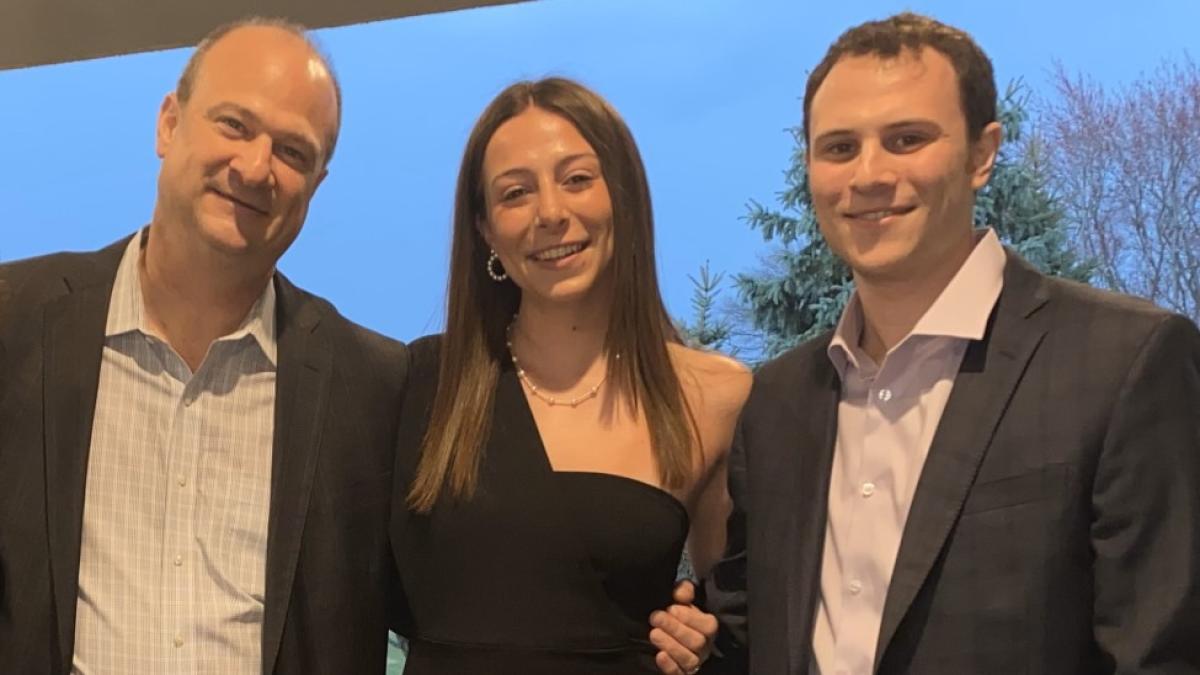

When Joseph Churgin graduated from the Elisabeth Haub School of Law at Pace University in 1993, he never could have imagined that 32 years later, two of his children would not only be studying law but attending the same law school. “I felt incredibly proud that both Hunter and Emma wanted to attend law school where I got my start,” shared Joseph. “It was the perfect fit for me, and I hoped that it would be for both of my children as well.”
Hunter Churgin ’24 chose Pace Haub Law because he appreciated the location and valued the positive experiences that his father had. “My father definitely helped shape my decision to attend law school,” said Hunter. And, while Emma Churgin ’27, was not always set on a legal career, she was inspired by seeing her brother graduate from law school. “It was inspiring to see Hunter and his classmates celebrate their hard work,” recalled Emma. “After that, I rethought my career path, talked to my parents, and Hunter, and ultimately decided to take the LSATs and pursue law school. Since that point, I have been confident in my decision and feel fortunate to have my brother and dad help guide me through this experience.” Emma chose Pace Haub Law because she witnessed first-hand the success that her brother and father had with their degrees from the school, but she also appreciated the ability to enroll in the January admit program and graduate in 2 ½ years.
While Emma only recently started at the Law School, she is enjoying her experience so far. “The professors have all been wonderful and helpful through my 1L year,” said Emma. Hunter has also done his part to recommend classes and experiences to Emma. “The prosecution externship with Professor Barry helped solidify what I am doing now. I really enjoyed that opportunity and I recommended Emma take a course with her.” After graduating in 2024, Hunter started work as an Assistant District Attorney with the Nassau County District Attorneys Office.
The experience of having both a sibling and father attend the same law school as her has been extremely useful for Emma. “I really enjoy being able to discuss what I am learning with both of them,” shared Emma. “Being able to ask my dad questions has kept me from getting overwhelmed - and has been a nice bonding moment for us. Since Hunter graduated last year, I’ve also enjoyed being able to call him to ask about future classes or what he had done to be successful during his law school experience.”
After working for 11 years at a New York City Law firm, Joseph wanted to spend more time with his family, so he partnered with an established lawyer in Rockland County and launched his own firm, working primarily in litigation and land use. “I had such a positive law school experience, and it has been wonderful seeing Hunter, and now Emma, have that same experience.”
“The world is waiting for you.”: Tubi CEO Anjali Sud Inspires Seidenberg School Grads at 2025 Pace Commencement
Tubi CEO Anjali Sud, a first-generation Indian American and one of the tech industry’s most prominent leaders, addressed thousands of graduates and guests at Pace University’s Commencement.
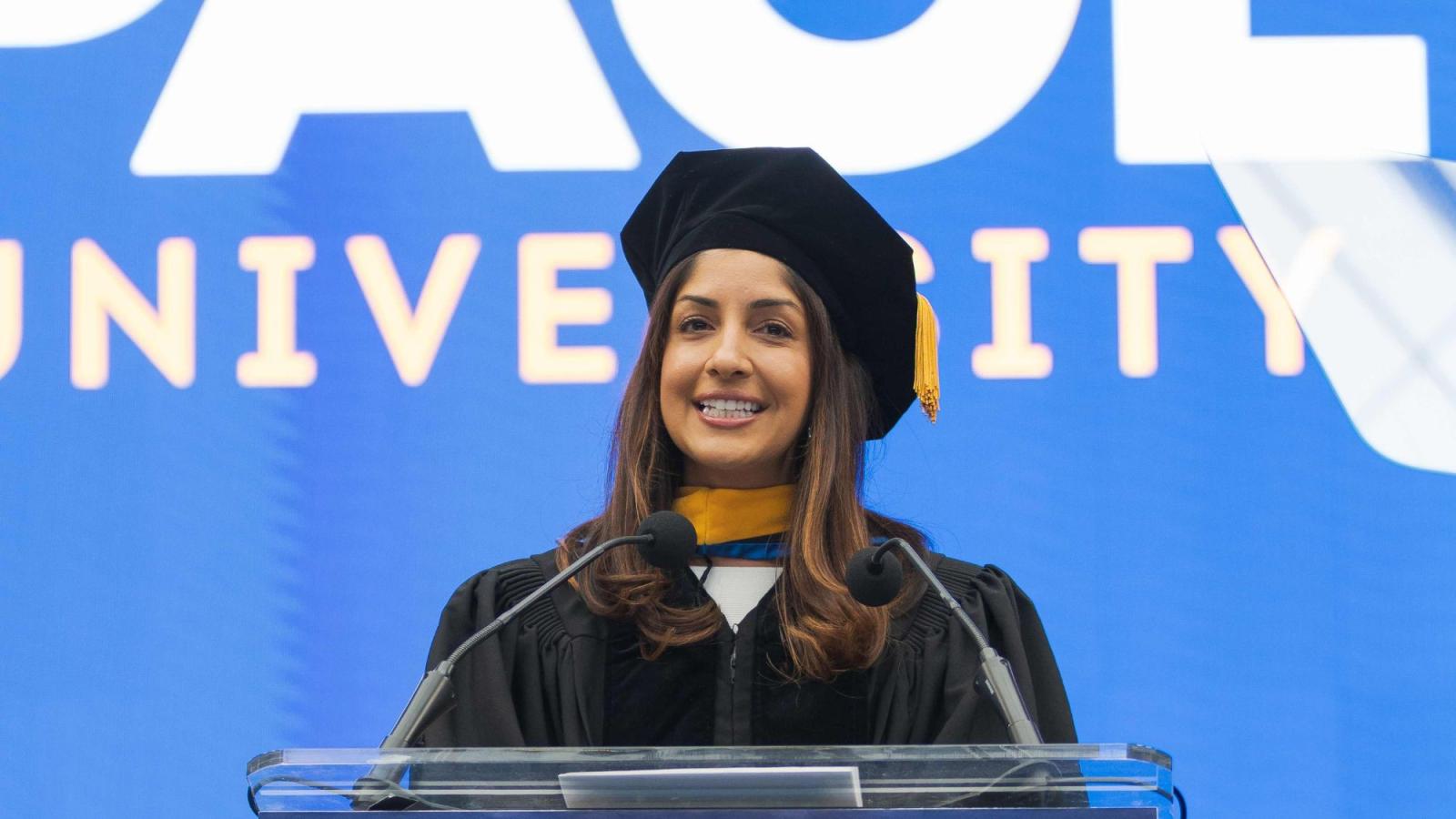
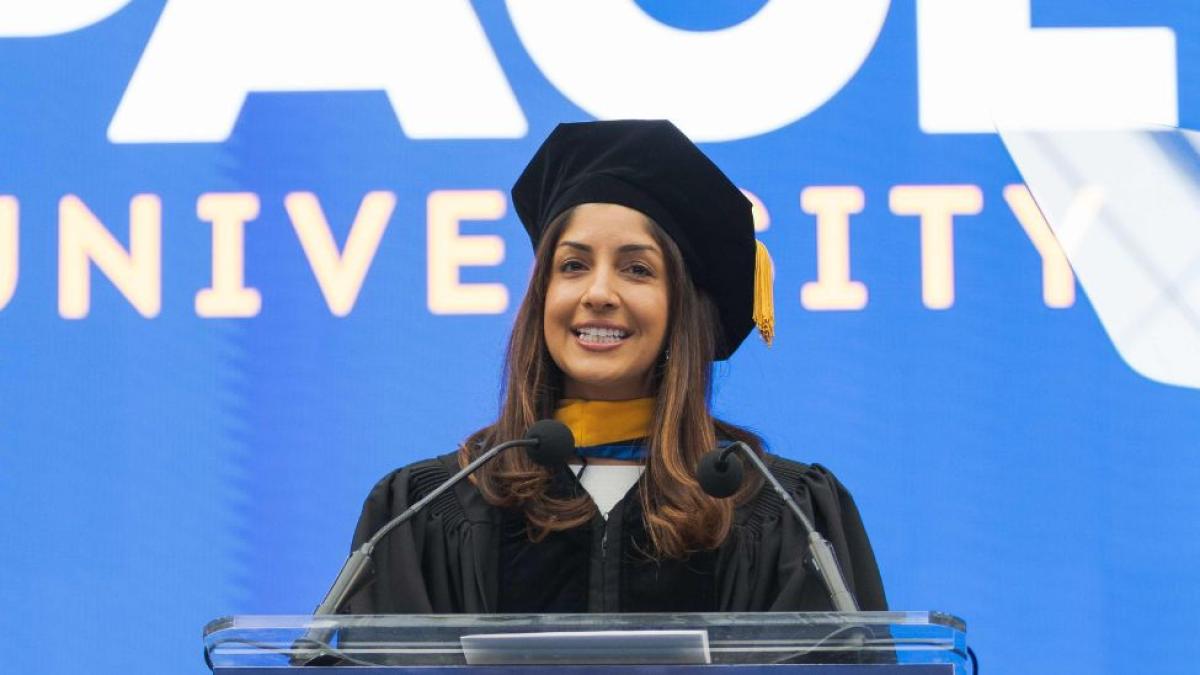
Pace University Commencement, 2025. Two jam-packed days of celebrations, degree conferrals, proud families and friends, and spectacular speeches.
Tubi CEO Anjali Sud, a first-generation Indian American and one of the tech industry’s most prominent leaders, addressed thousands of graduates and guests at Pace University’s Commencement.
During her remarks at the Seidenberg School of Computer Science and Information Systems ceremony, which honored hundreds of international graduates, Sud urged the Class of 2025 to pursue impact, embrace authenticity, and lead with boldness in a rapidly changing world.
“Get out there and be passionate,” said Sud. “Be brave. And most of all, be you. The world is waiting for you, and we need you.”
Drawing on her journey from Flint, Michigan to the helm of Tubi, one of America’s most-watched streaming platforms, Sud shared lessons from her career and reflections on family and identity, noting how her upbringing helped shape her approach to leadership, resilience, and purpose.
“Surround yourself with optimists,” she continued. “If you look across every technologist, entrepreneur or innovator you admire – across all personalities, styles, mantras, philosophies, you’ll find that they all have this trait in common.”
Sud, who received an honorary PhD in Computer Science degree, previously held leadership roles at Amazon, Time Warner, and Vimeo—where she served as CEO and scaled the platform to over 300 million users globally—before joining Tubi in 2023. She is also a mother of two and a vocal advocate for inclusive storytelling and accessible technology.
“The way to create enduring value in the world is to build tangible things,” Sud told graduates. “Ideas are powerful, but impact comes from real products that help real humans.”
“You each possess the power in your brains and fingertips to build things. So use your craft. Hone your craft. Accelerate your craft.” Pace University’s Commencement ceremonies regularly attract a global audience, reflecting the University’s reputation for academic excellence and its strong appeal to international students, particularly from South Asia. With international students representing 22% of its student body, Pace University exemplifies a vibrant, inclusive community shaped by global perspectives.
Sud’s biographical information was read by Lolita Tiwari, a double alum from Pace with a BS in Economics and Statistics and an MS in Enterprise Analytics from the Seidenberg School. Tiwari, who is a Strategic Partner Manager at Google, first met Sud at the Seidenberg Innovation Awards, where Sud was an honoree. Sharing similar backgrounds, Tiwari was impacted by seeing someone like herself represented at the executive level.
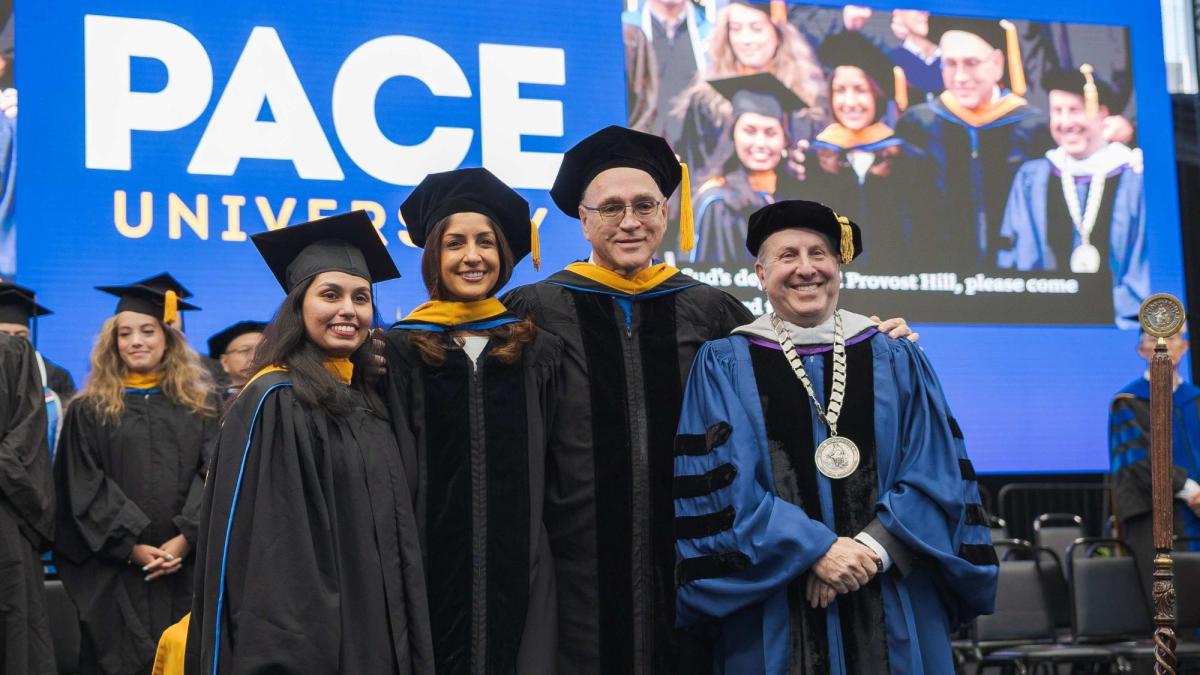
Since first meeting Sud, Tiwari has joined the Seidenberg Advisory Board and leads the Seidenberg Young Alumni Engagement Committee.
“It is an honor to have a place in the Pace community where I am able to represent women empowerment and equity,” Tiwari said. “I believe my life purpose includes forming pathways and extending light that ripple effects to others finding their voice. Sharing this moment with my mentor Anjali on stage at commencement was a moment that merged present and future, reminding me that limits truly do not exist.”
Pace University attracts strong interest from Indian students across its academic schools, particularly its Seidenberg school of technology. The university saw a 10% increase in enrollment from 2022 to 2023, with the Seidenberg School in particular seeing a remarkable surge of Indian students of a nearly 400% increase since 2020, reflecting the school’s global appeal in STEM education.
Sud’s remarks resonated with many in attendance.
“Hearing Anjali Sud speak at our Commencement was truly inspiring,” said Rahul Mani Subramani, a graduating international student from the Seidenberg School. “Her message about building real things that help real people, and doing it with courage and authenticity, really resonated with me. As someone about to enter the tech industry, it was empowering to be reminded that optimism, honesty, and purpose matter as much as code.”
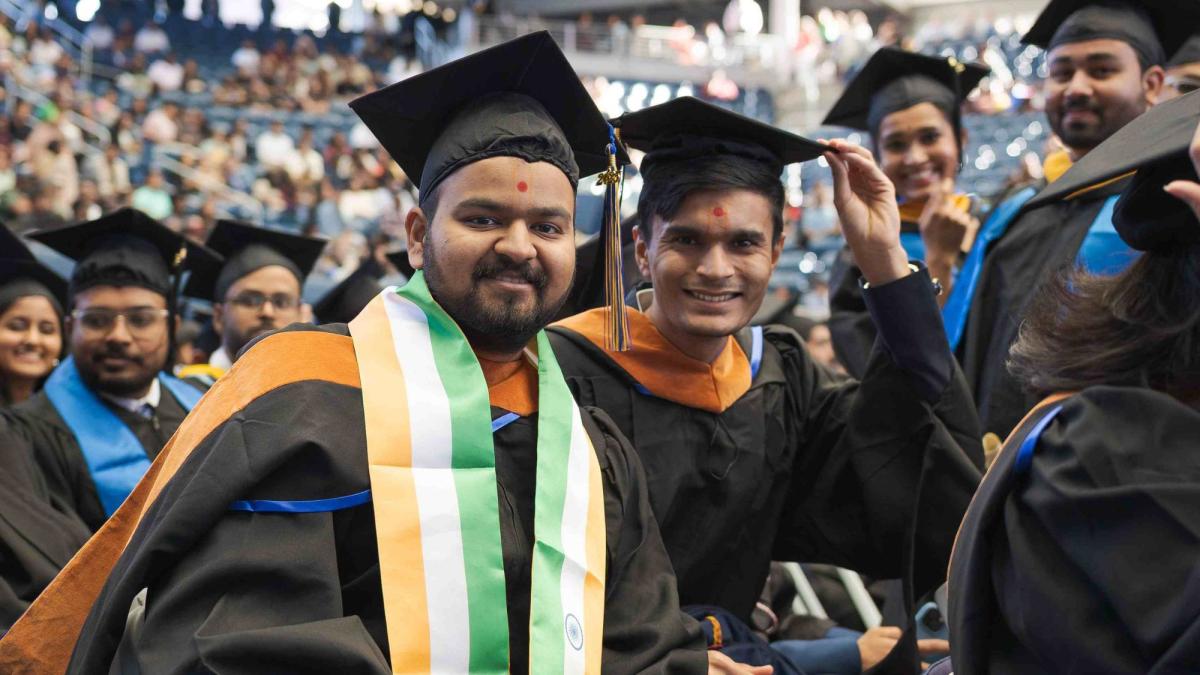
Pace University, with campuses in New York City and Westchester County, offers students a front-row seat to some of the world’s most dynamic professional and cultural opportunities. The combination of New York City’s opportunities and Pace’s highly ranked programs in business, law, and technology continues to make it a destination for aspiring global leaders.
The two-day Commencement celebration welcomed nearly 20,000 attendees and featured five school-specific ceremonies, student speakers, a food village, and live music—showcasing the breadth of Pace’s academic offerings and its community spirit. Sud’s address was among the highlights of the two-day celebration.
Other distinguished speakers included Etsy CEO Josh Silverman, Golden Globe–nominated actor Cooper Koch ’18, Northwell Health executive Dr. Launette Woolforde ’93, and New York City Fire Department Commissioner Robert S. Tucker ’96.
During the main ceremony, Pace President Marvin Krislov reminded students that their education carries both opportunity and responsibility.
“You carry more than a degree—you carry a promise,” President Krislov said. “A promise to your family, to yourselves, and to the Pace community. A promise to keep learning, to stay curious, to lead with empathy, to use your education not just for you to advance, but to bring others along with you.”
“Stay open. Stay resilient. Keep asking, ‘What can I do?” Krislov continued. “Because higher education does more than just prepare you for a job. It does more than prepare you for a career. It prepares you to ask hard questions that will make your life meaningful, to help build strong communities, to speak up, and to successfully carry forward.”
Students celebrating this exciting achievement were a mix of undergraduate, graduate, law, and doctoral students, spanning a variety of disciplines and future careers, such as nurses and physician assistants, cybersecurity experts, lawyers, accountants, teachers, performers, and much more.
Ready for the Future: The Class of 2025 Boldly Goes Forth
As the Class of 2025 crossed the stage on May 19 and May 20, graduating students shared their plans for the future and reflected on their most memorable moments from their time at Pace—from meaningful mentorship from professors to career-altering courses to unforgettable extracurricular experiences.
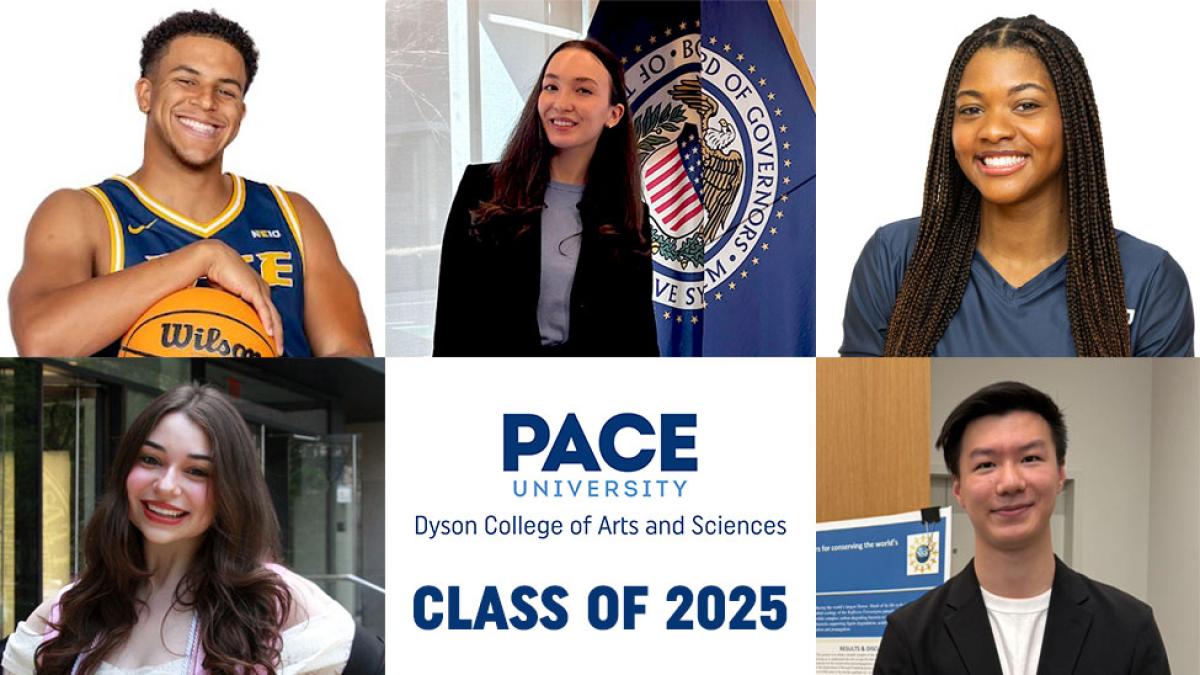
As the Class of 2025 crossed the stage on May 19 and May 20 at the USTA Billie Jean King National Tennis Center, graduating students shared their plans for the future and reflected on their most memorable moments from their time at Pace—from meaningful mentorship from professors to career-altering courses to unforgettable extracurricular experiences.
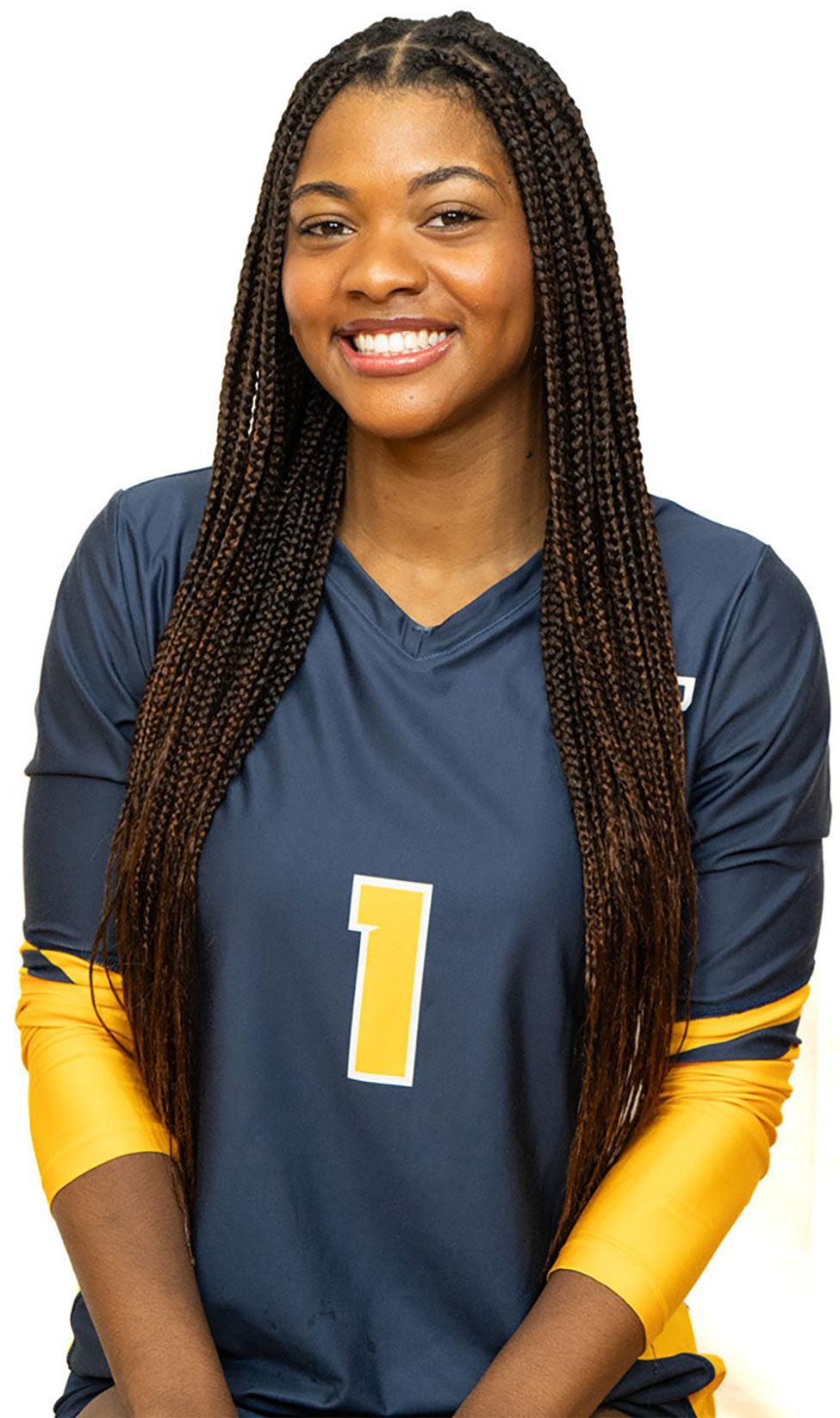
Morgan Amos
Biochemistry, BS
Pursing a PhD at Rutgers University
What research and internship opportunities did you have as a student?
I worked with Assistant Professor Karen Caldwell, PhD, on a research project on methamphetamine contamination within homes, which was funded by Pace’s Center for Undergraduate Research Experiences (CURE). Professor Caldwell has been a great mentor, giving me the confidence to pursue a future in research and supporting me throughout the graduate school application process. During the summers of 2023 and 2024, I interned at the National Institutes of Health’s National Institute on Aging, in Baltimore, Maryland, conducting computational biomedical research on two different studies involving aging and aging-related diseases.
How has being a student-athlete been meaningful to you?
The experience of playing defensive specialist on the women’s volleyball team was extremely rewarding. I have met some of my best friends on the team and have matured so much as a young adult. Adapting to my academic and athletic schedules was hard at times but has also taught me some of the best lessons. I also had the privilege to be the co-captain my last year, alongside fellow senior Abby Robertson. It was an honor and I had a great time in that role.
What are your post-graduation plans?
I am pursuing my doctoral degree at Rutgers University in their biomedical engineering program and with a concentration in binging and bioinstrumentation. I want to continue to be involved with biomedical research, specifically within engineering and neuroscience, and my career goals are to be a biomedical engineer for surgical innovation.
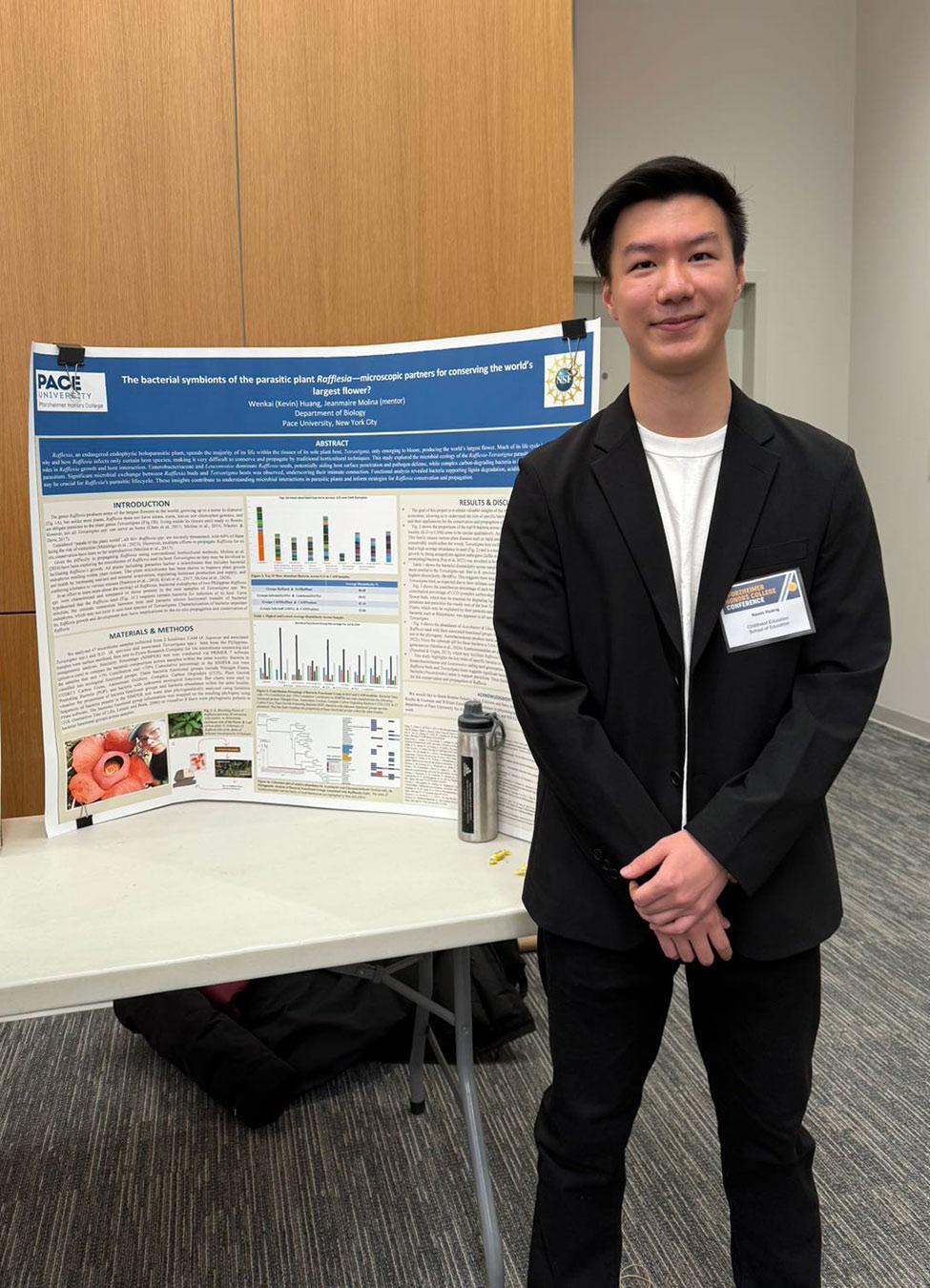
Kevin Huang
Childhood Education/Biology, BS
Pursuing a PhD at Penn State
Why did you pursue your major/degree program?
I chose an education major because I enjoyed working with children in summer camps in Shanghai, China, where I am from. Biology was also one of my favorite subjects in high school, and when I realized my passion for research in my junior year at Pace, I continued with my education major in the School of Education and enrolled in as many biology and chemistry courses in Dyson College of Arts and Sciences as possible. Pace came up on my radar because one of my best friends had been admitted, and, since it offered an education major (my primary interest at the time), I applied and decided to enroll.
Which faculty member(s) had the most impact on your experience?
In my sophomore year, Professor Eric Brenner, PhD, introduced me to research, and, with funding from Pace’s Provost Office, I presented my work on plant movement in his lab at the National Conference of Undergraduate Research in Long Beach, California. In my junior year, Professor Jeanmaire Molina, PhD, funded me, through her National Science Foundation grant, to attend the world’s largest plant biology conference, the American Society of Plant Biologists, in Hawaii, where I shared our research on the endangered Rafflesia plant. Additionally, I have co-authored two papers with her; one published in Current Plant Biology, and another in EvoS Journal: Evolutionary Studies and Higher Education. At a conference at the WPUNJ Symposium at William Paterson University, funded by the Biology department, I presented posters for my research with both Professors Brenner and Molina, and each won second place in their respective categories.
What are your post-graduation plans?
I will be joining Penn State’s Plant Biology PhD Program to continue pursuing my passion in plant biology research.

Jaden Kaely
Communications, BA
Pursuing an MBA at Pace University
What were your favorite course(s) and why?
My favorite course was Basic American Sign Language (ASL) with Professor Emmanuel Azodeh. Through it, I learned about the significant history of Deaf culture and was embraced by the Deaf community through my professor and other students. We were not only a class, but a growing testament to culture and the importance of acceptance and understanding of all types of people. ASL was not taught as a true disability, but rather a growing area of knowledge that is becoming more valuable and modernized into today’s world.
Which faculty member(s) had the most impact on your academic experience?
One of my most impactful professors was Samuel Ravech, Sports Journalism and Sports Broadcasting. An active ESPN broadcaster and PlayxPlay analyst, he provided insight into the sports and entertainment industry and helped encourage my career pursuits by providing both meaningful criticism and praise for my work in class. It taught me to be confident in my voice and even inspired me to be the public address announcer of athletic games on campus.
What are your post-graduation plans?
In fall 2025, I will be returning to Pace to pursue a general MBA in the Lubin School of Business. I was able to complete my undergraduate degree in just three years with transfer credits, and with this graduate opportunity, I will be returning for my fourth and final year of eligibility while a part of the Pace men’s basketball team. Being a student-athlete at Pace has been wonderful and I look forward to pursuing endeavors that come with furthering my education next year.
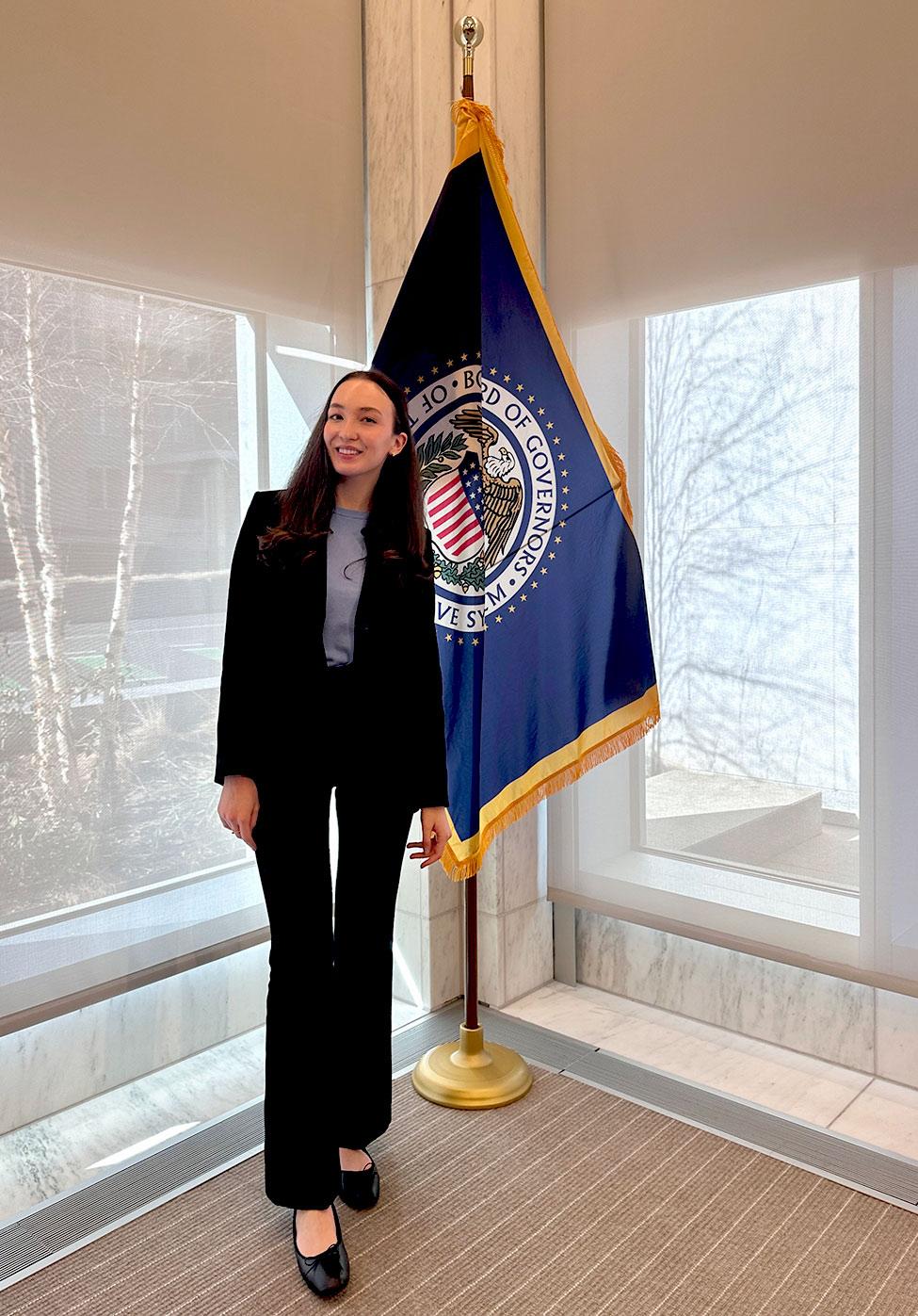
Viktoriia Yevtushenko
Business Economics, BS
Pursuing a master’s degree at Columbia University
Why did you pursue your major/degree program?
I began my studies at Pace as a marketing major but quickly realized that what I enjoyed most were the courses involving data, statistics, and analysis. I started exploring the Economics Department and was impressed by how much it had to offer: strong academics, supportive professors, and opportunities to learn outside of the classroom. Switching to economics ended up being the best decision I made, helping me grow in ways I didn’t expect.
Which faculty member had the most impact on your experience?
Professor Anna Shostya, PhD, made the biggest impact on my experience at Pace. She genuinely cares about her students, not just academically, but personally, and thanks to her support, I was able to complete a UN Millennium Fellowship that was very personal to me. My project, The War Through Children’s Eyes, focused on raising awareness on how the war in Ukraine has affected children, especially their education and emotional well-being. We gave these children a chance to express their experiences through artwork, accompanied by short stories about their lives. We then organized an exhibit on the New York City campus to showcase their work and share their voices with the Pace community.
What are your post-graduation plans?
After graduation, I’ll be attending Columbia University to pursue a master’s degree in quantitative methods in the social sciences, with a concentration in economics. I’m incredibly excited for this next chapter, and I know I wouldn’t be here without the education and support I received at Pace. The Economics department gave me a strong foundation, encouraged my curiosity, and gave me the tools to take my interests further.
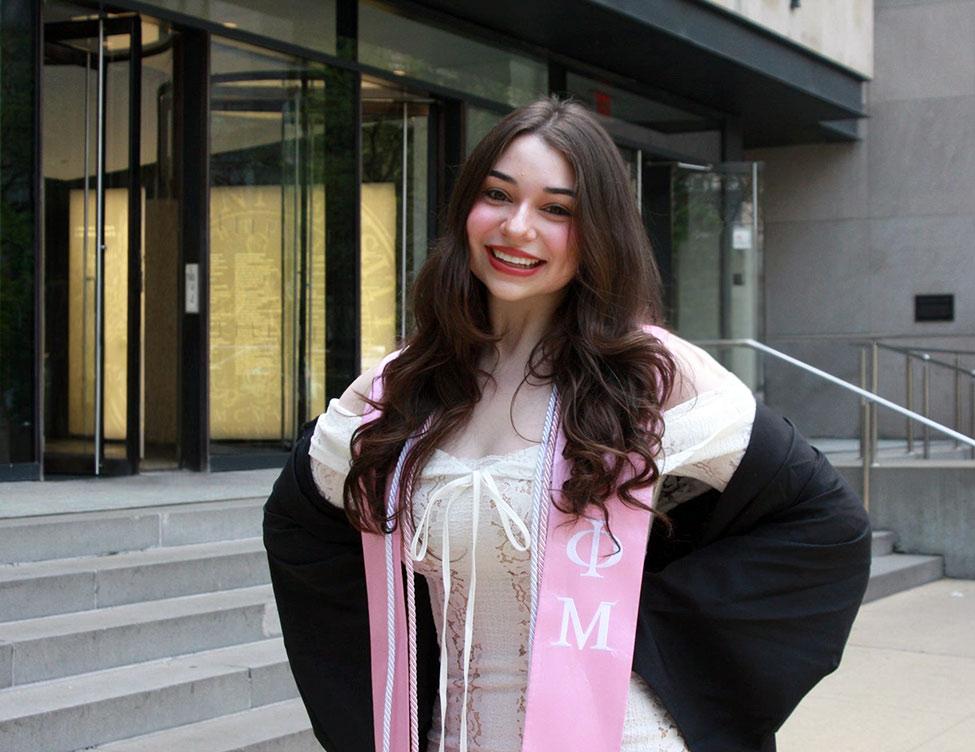
Kaitlyn Weinerman
BA in Psychology
Pursuing a master’s degree at Columbia University
Why did you pursue your major/degree program?
I pursued a major in Psychology because I want to make a positive impact on my community, and service those who truly need it. It has always been and will always be my passion.
What were your favorite course(s) and why?
My favorite courses have been Sexuality, Reproduction and the Family, Psychology of Civic Engagement, and Group Relations and Interview Techniques. These courses helped me fully realize my passion for service and psychology, and how we relate to the world around us. Taught by amazing professors, these courses helped me grow and shaped my view of the world.
What are your post-graduation plans?
I will be attending Columbia University for a Master of Science in Social Work (MSSW). I will be continuing my research on risky sexual behavior in college students, and I plan on working in hospitals, agencies, schools, and shelters throughout my career in social work.
More Pace Go-Getters
Valedictorian speaker Georgette Cosentino is a standout student-athlete and neuroscience researcher. Opportunitas speaker Dante Hurr is a trailblazing first-gen graduate and tech leader whose journey from hardship to empowerment is nothing short of inspiring. Hear their stories at the 2025 Commencement.
Two extraordinary Setters will be honored with Pace’s prestigious 2025 Trustee Award at this year’s Commencement ceremony. Meet Layne Davis and Brianna Shea, and discover how they’re already making their mark.
Each year, the Community Service Award shines a light on students who turn vision into action and passion into impact. This year, we are proud to honor Jasmine Cintron-Soto ’25 and Jamie-Lynn Figueroa ’25 for their tireless advocacy and their commitment to building a stronger, more inclusive community.
Pace University Joins National Undergraduate-to-PhD Computer Science Research Program
Pace University’s Seidenberg School of Computer Science and Information Systems has joined the Undergraduate Research to PhD (UR2PhD) mentorship program, a nationwide initiative from the Computer Research Association’s (CRA) aimed at providing students with support to develop into strong researchers.
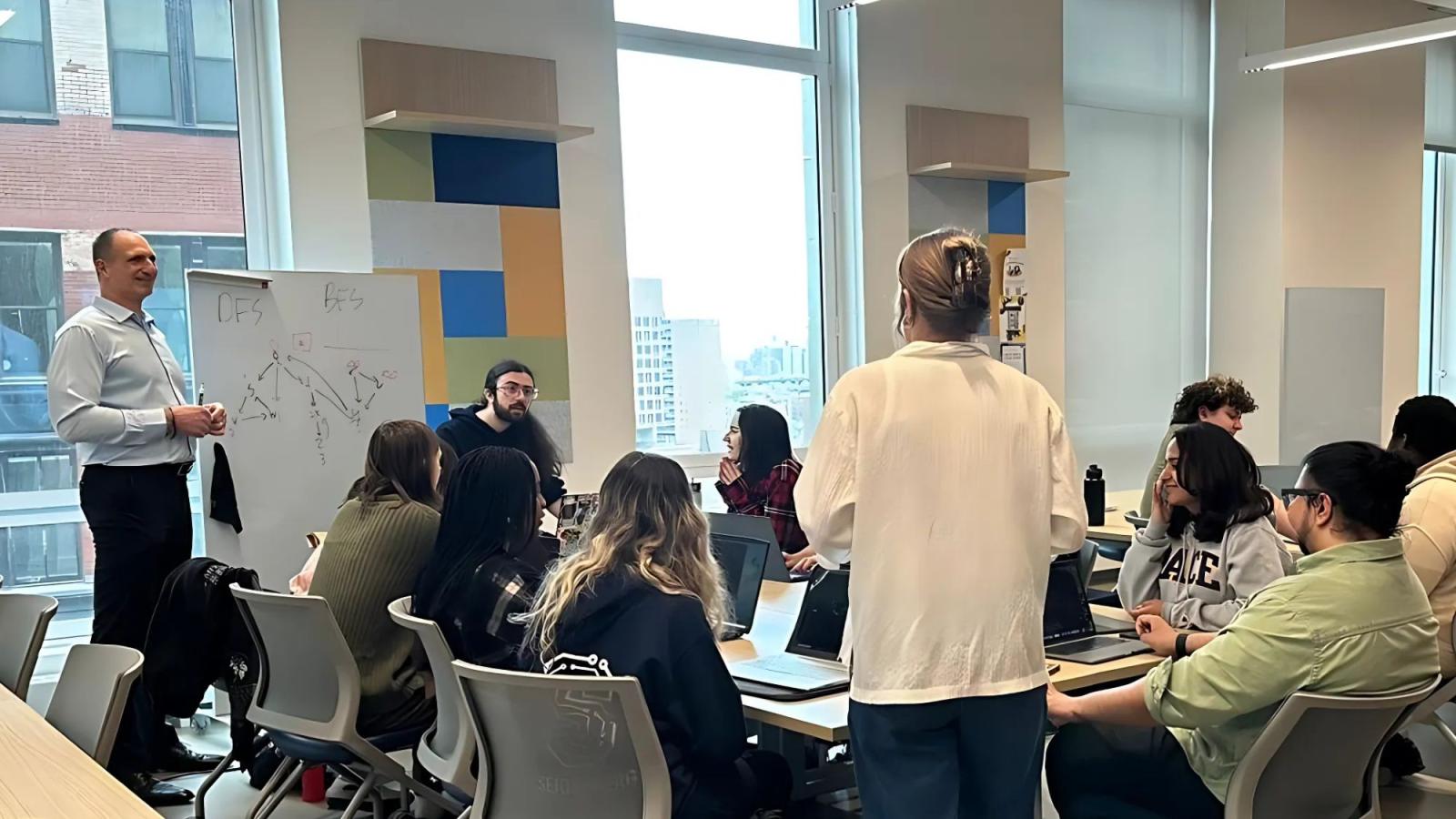
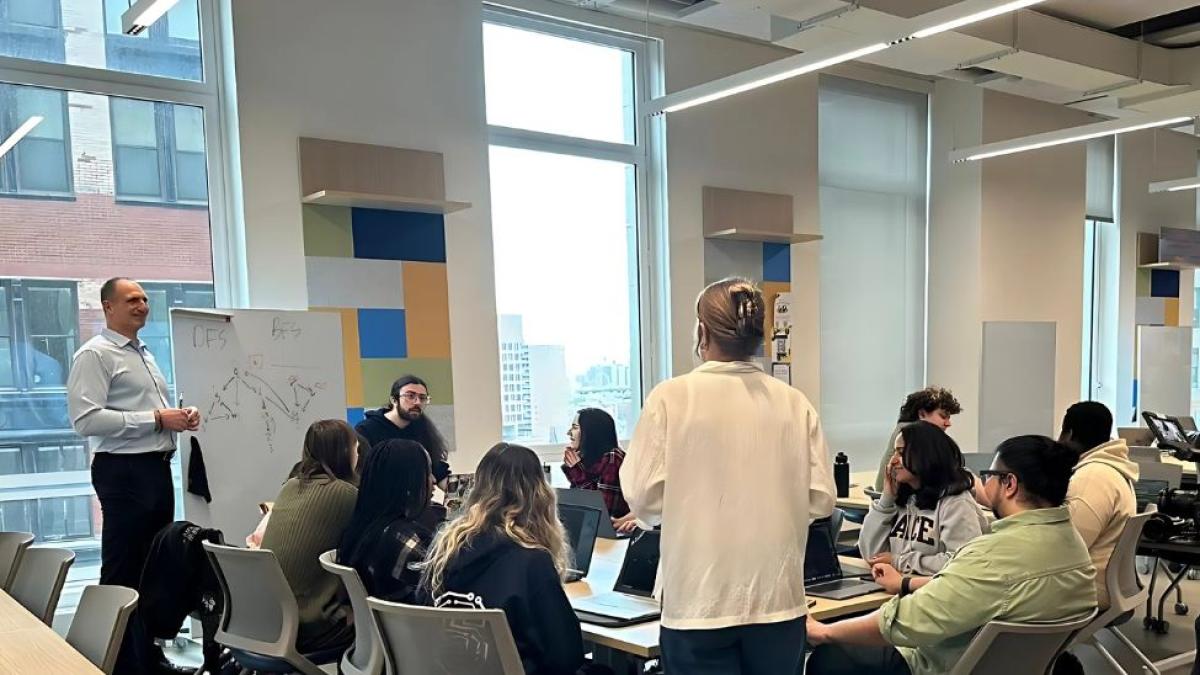
Pace University’s Seidenberg School of Computer Science and Information Systems has joined the Undergraduate Research to PhD (UR2PhD) mentorship program, a nationwide initiative from the Computer Research Association’s (CRA) aimed at providing students with support to develop into strong researchers.
The program connects undergraduate students to high-quality research opportunities, pairing them with graduate mentors and faculty to support their development of key computer science research skills. Additionally, the program connects undergraduate students with the experiential learning and research opportunities that can lead to graduate study.
At Pace, UR2PhD will be embedded within the Seidenberg Summer Undergraduate Research (SSUR) program—an annual, hands-on research experience for undergraduate students. This summer’s cohort includes 15 undergraduate students, six graduate student mentors, and eight faculty advisors.
“This is the first year that graduate students will be involved in SSUR,” said Christelle Scharff, PhD, professor of computer science, who has led SSUR for four years and applied for Pace to join UR2PhD. “The program is important for our students and for experiential learning at Pace.”
During the program, undergraduate students will take a research skills course designed to reinforce their understanding of the research process, enhance written and oral communication, promote teamwork and collaboration, and foster a computer science research identity within the broader research community. They will also learn to consider the social, ethical, and cultural impacts of their computer science research projects.
Pace faculty participating in the program include professors Krishna Bathula, Matt Ganis, Carmine Guida, Christelle Scharff, Tom Schmidt, Juan Shan, and Jonathan William. For this summer, the research projects will focus on areas including machine learning, cybersecurity, drones, game development, virtual reality, and human centered design.
Students will receive a stipend to support their participation from the CRA, as well as opportunities to receive funding to present their projects at conferences.
“Undergraduate research is a cornerstone of building a strong academic community,” said Li-Chiou Chen, PhD, dean of the Seidenberg School of Computer Science and Information Systems. “Through this program, our students will have opportunities to develop their research skills and make meaningful contributions to the field, which is more important than ever.”
Press Release: Pace University Art Gallery Presents Anthology from the Lise Curry Collection
Pace University Art Gallery is pleased to present Anthology: Contemporary Narrative Art from the Lise Curry Collection, a faculty/student-curated exhibition celebrating the generous bequest of more than 200 works of art from collector Lise Curry. The exhibition opens with a free public reception on Friday, June 6, from 5:00 p.m. to 7:00 p.m. and will remain on view through September 13, 2025.
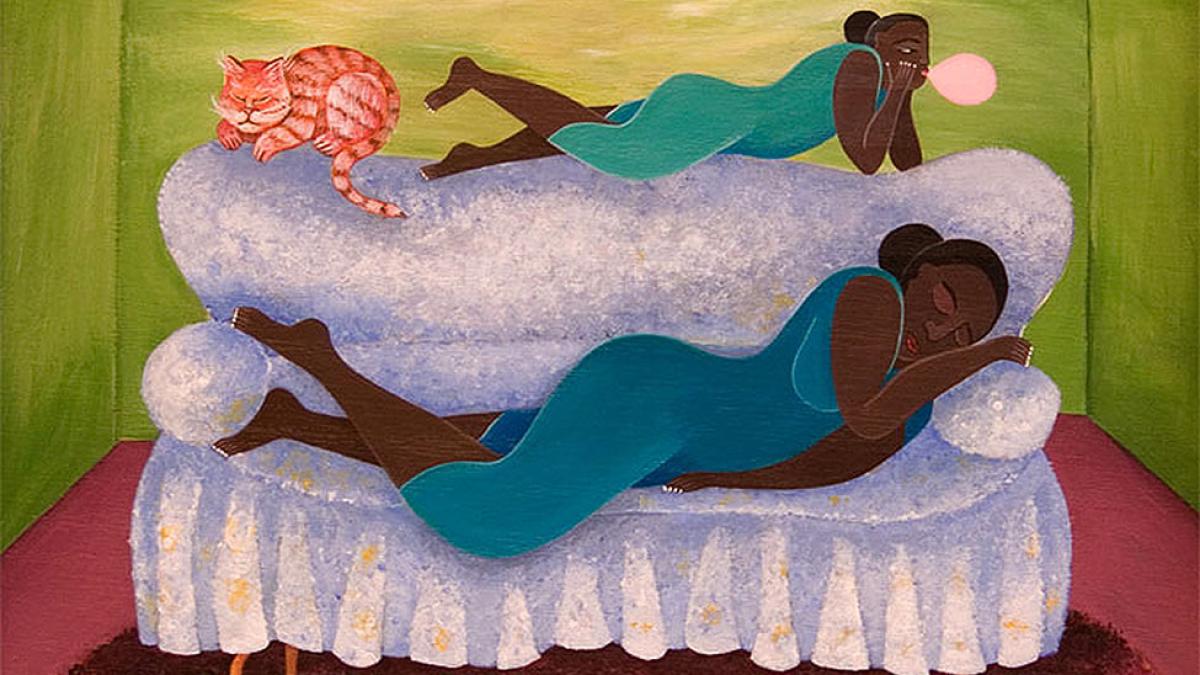
Faculty/student-curated exhibit features more than 30 artists and four narrative themes exploring joy, integrity, and curiosity.
Pace University Art Gallery is pleased to present Anthology: Contemporary Narrative Art from the Lise Curry Collection, a faculty/student-curated exhibition celebrating the generous bequest of more than 200 works of art from collector Lise Curry. The exhibition opens with a free public reception on Friday, June 6, from 5:00 p.m. to 7:00 p.m. and will remain on view through September 13, 2025.
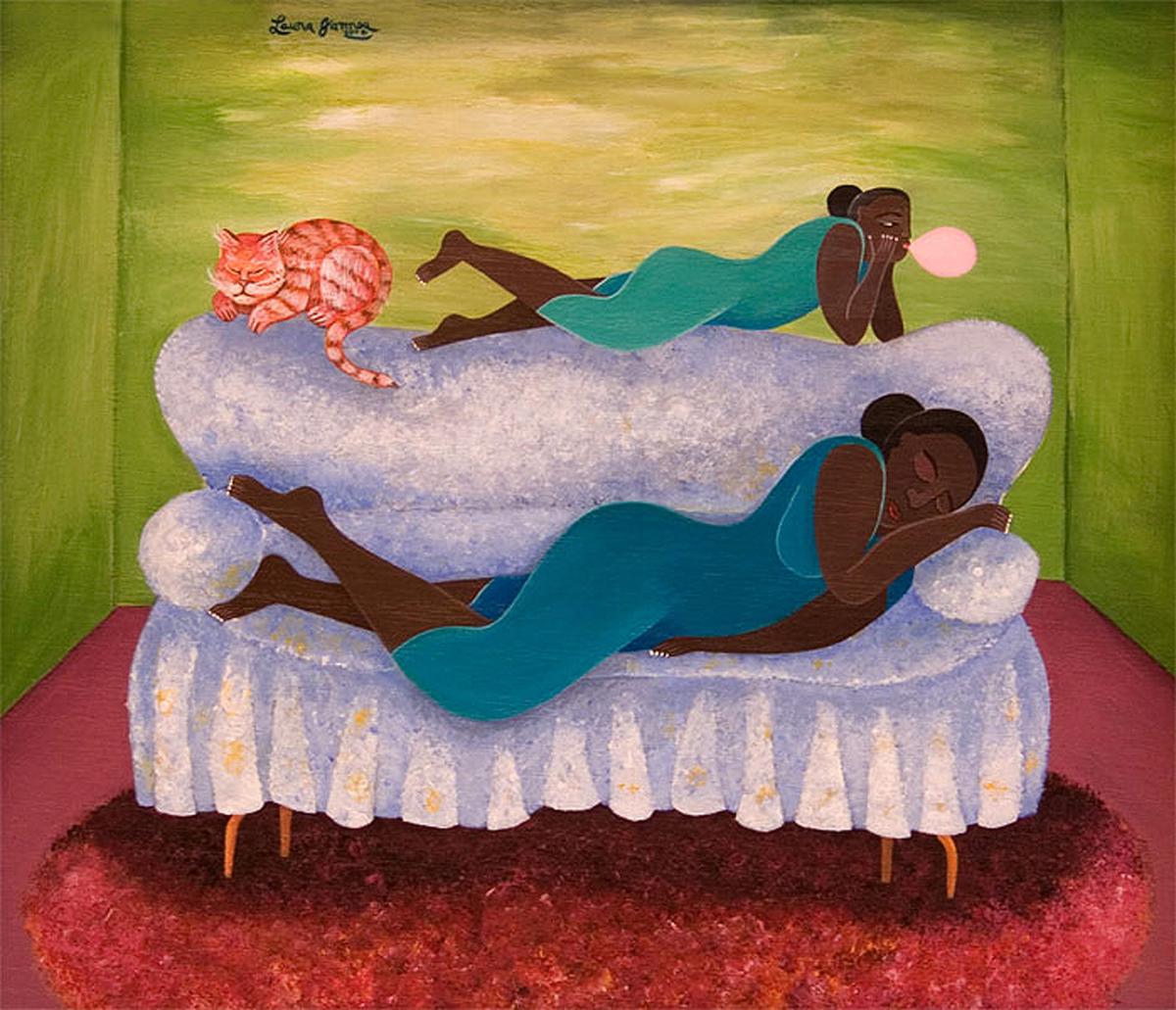
Created in alignment with Curry’s vision for an academic collection that fosters education and engagement, the exhibition was curated by Pace students Ellis Clay ’25 and Vesper Vargas ’28 under the guidance of gallery director Sarah Cunningham.
“Curating this exhibit has been the highlight of my freshman year,” Vargas said. “As an art major, I gained valuable insight into how exhibitions are created from start to finish.”
With its broad thematic range, the Curry Collection inspired the curatorial team to shape the exhibition around four narrative-driven sections: Strong Women, Relational Pairs, City of Jazz, and Natural Abstraction— viewed as chapters in a larger narrative about living with joy, integrity, and curiosity. The Anthology exhibit features work by more than 30 contemporary artists working in painting, drawing, and photography. As part of the exhibit, the gallery has also commissioned a new site-specific textile installation by artist Rosa Chang, who expands on her existing piece in the collection using traditional Korean indigo and natural dye techniques.
“I am so grateful to Ms. Curry for her remarkable gift, which is already transforming the way we teach and learn here at Pace,” Cunningham said.
Featured artists include Elana Adler, Daphne Arthur, Maya Brodsky, Bri Cirel, Beatrice Coron, Antide de Champagne, Francks Deceus, Rose Deler, Lola Flash, Joseph Franklin, Takao Fujioka, Takao Fujioka, Jocelyne Gaudreau, Nathalie Grenier, Cynthia Hartling, Zach Horn, Laura James, Philippe Lechien, Peter Leitch, Christine Mace, Megan Marlatt, Carolina Martinez, Felicita Maynard, Hibiki Miyazaki, Rebecca Morgan, Rachelle Mozman, Rowan Renee, Sigita Rucinskaite-Praneviciene, Sir Shadow, Joshie South, Natsuki Takauji, Mark Tanabe, Willie Torbert, and Rasa Vaisvilaite.
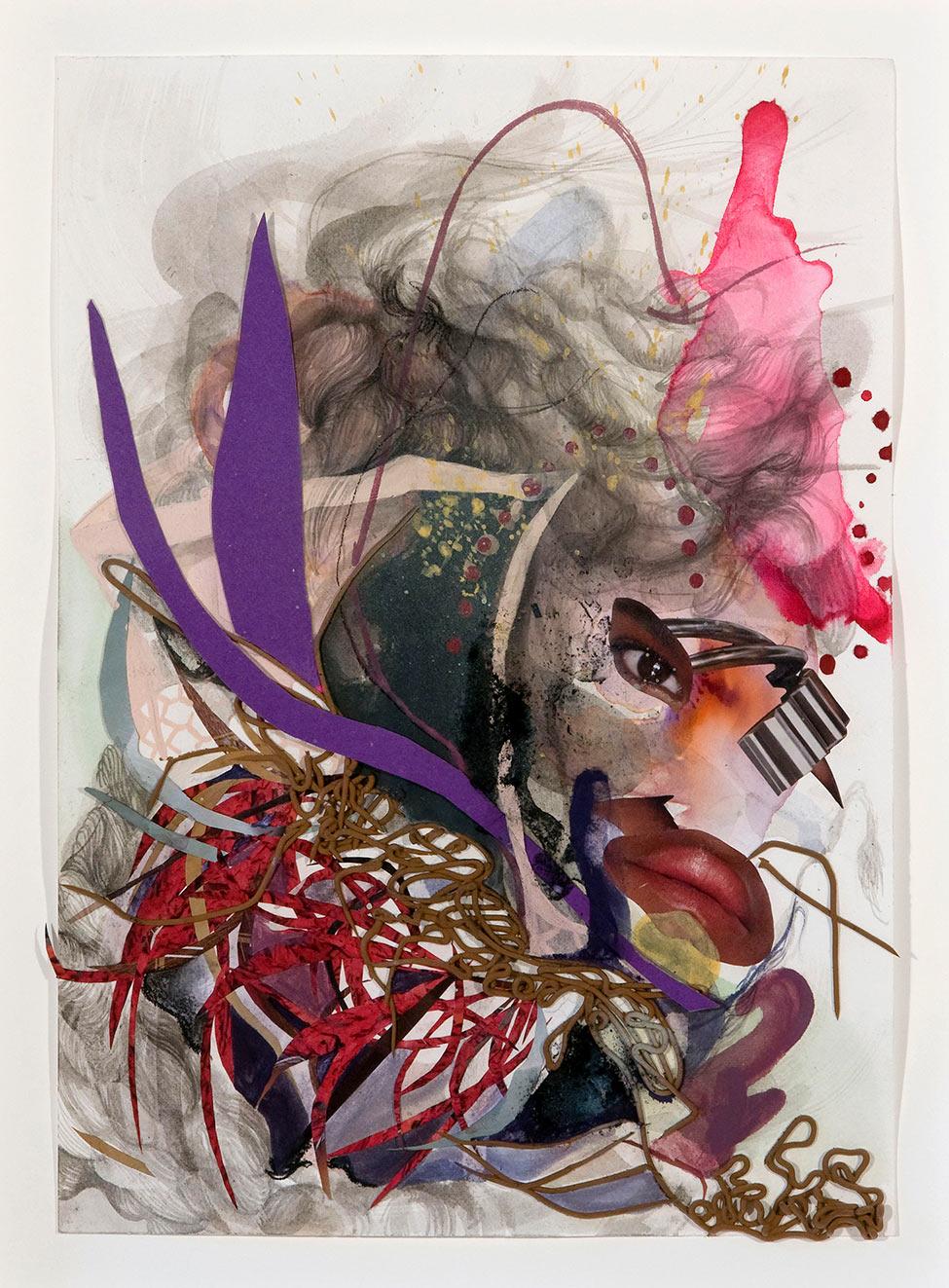
The Anthology exhibit, which remains on view through Saturday, September 13, 2025, is made possible by the New York State Council on the Arts with the support of the Office of the Governor and the New York State Legislature. Additional funding was received from the Center for Undergraduate Research Experiences (CURE) at Pace University.
All the gallery’s exhibits and events are free and open to the public. Summer gallery hours are Wednesday through Saturday 1:00 p.m.–6:00 p.m. Please check the gallery Instagram for the University holiday closures. The gallery is in Lower Manhattan at 41 Park Row.
About the Pace University Art Gallery
Founded with the conviction that art is integral to society, the Pace University Art Gallery is a creative laboratory and exhibition space that supports innovation and exploration for both artists and viewers. Open to students, staff, and faculty from across the Pace campuses and, equally, to the Lower Manhattan community and visitors from around the world, the Art Gallery encourages personal investigation and critical dialogue via thought-provoking contemporary art exhibits and public programming. Enhancing the Art Department's Bachelor of Arts and Bachelor of Fine Arts programs, the Art Gallery offers students real-world opportunities to exhibit their own art and to work directly with professional artists to install and promote exhibitions. All exhibits and events are free and open to the public.
About Dyson College of Arts and Sciences
Pace University’s liberal arts college, Dyson College, offers more than 50 programs, spanning the arts and humanities, natural sciences, social sciences, and pre-professional programs (including pre-medicine, pre-veterinary, and pre-law), as well as many courses that fulfill core curriculum requirements. The College offers access to numerous opportunities for internships, cooperative education and other hands-on learning experiences that complement in-class learning in preparing graduates for career and graduate/professional education choices.
About Pace University
Since 1906, Pace University has been transforming the lives of its diverse students—academically, professionally, and socioeconomically. With campuses in New York City and Westchester County, Pace offers bachelor, master, and doctoral degree programs to 13,600 students in its College of Health Professions, Dyson College of Arts and Sciences, Elisabeth Haub School of Law, Lubin School of Business, Sands College of Performing Arts, School of Education, and Seidenberg School of Computer Science and Information Systems.
Making Minors Major: Nishchay Ingale ’27
Not every leader starts with a business major—meet the students turning Lubin minors into major wins.
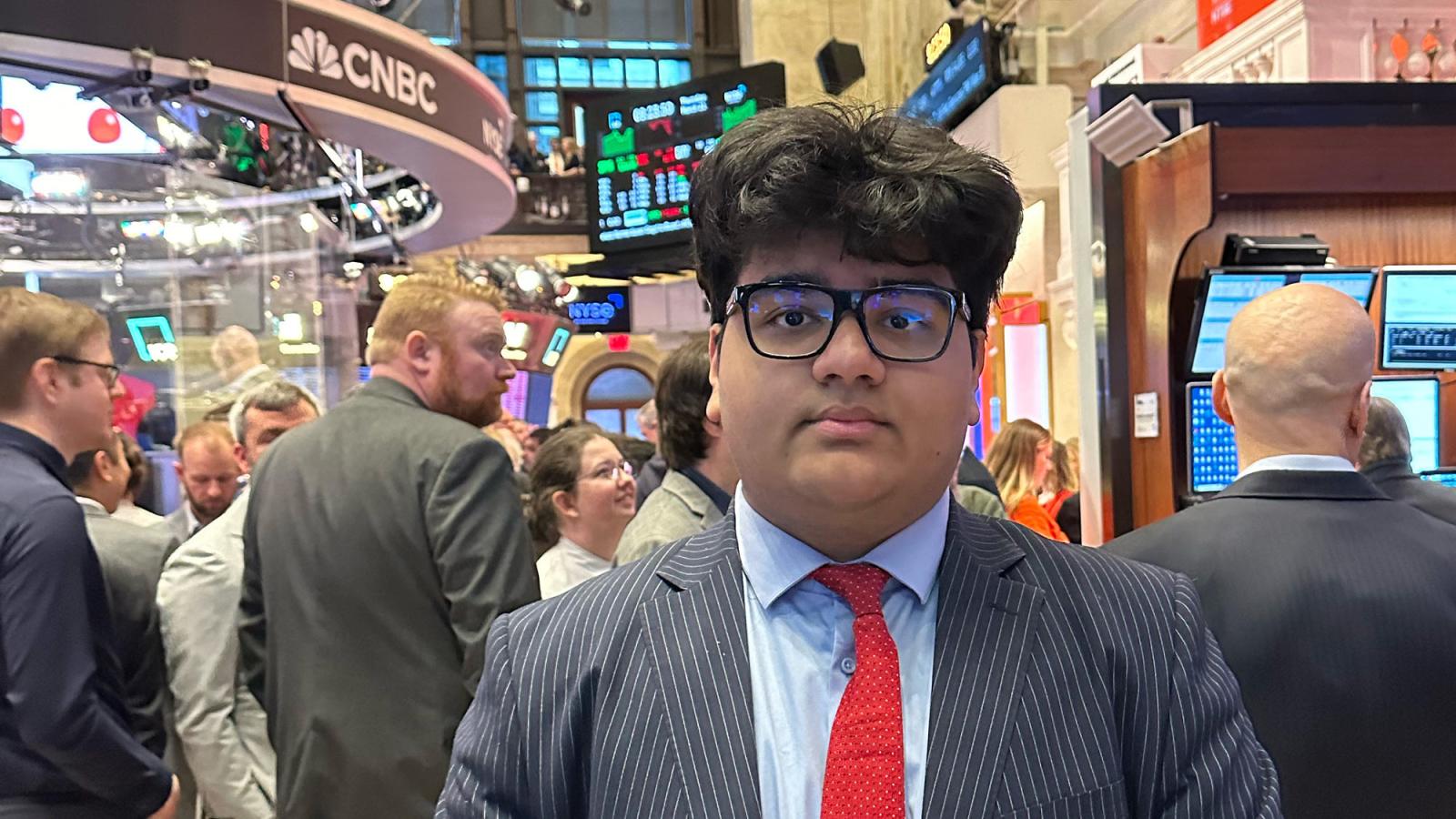
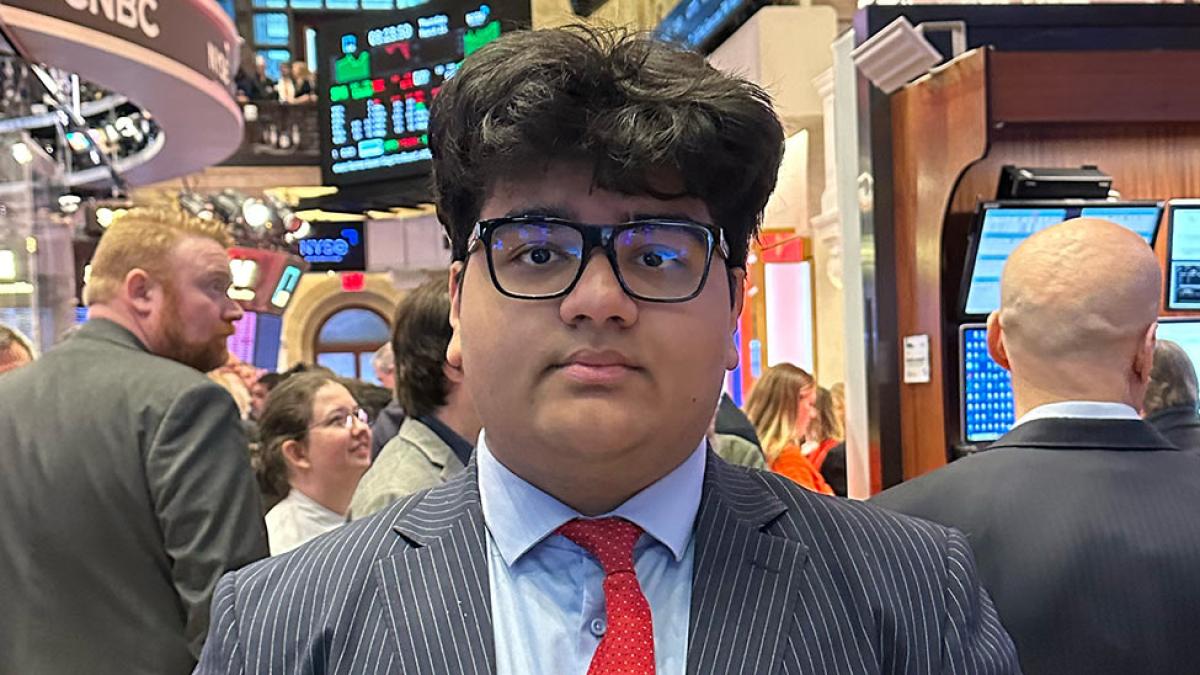
Nishchay Ingale
Class of 2027
Pronouns: He/Him
Currently Studying: Bachelor of Science in Business Economics with a Minor in Finance
Why did you choose Pace University and the Lubin School of Business for your minor?
Growing up, I always envisioned myself working on Wall Street. Pace University’s location in the heart of downtown Manhattan—just steps from the New York Stock Exchange—made it the perfect choice. The University’s strong ties to the financial industry and its deep-rooted presence in the city’s business landscape made it the ideal place to study finance and launch my career.
As one of the youngest interns at the New York Stock Exchange, how has this experience shaped your career goals?
I’ve been interested in financial markets since middle school, but joining the New York Stock Exchange helped me grow even more—both personally and professionally. It’s been a strong start to my trading career. I receive valuable advice from my colleagues every day and continue to learn something new at the Exchange, which I know will help me become a great trader in the future.
Can you tell us more about launching Ingale Research? What inspired you to start your own equity research firm, and what are your goals for its future?
This summer, I launched Ingale Research—an independent firm focused on deep dives into company fundamentals and financials. We have analysts covering various sectors to help us understand the full scope of this beautiful market. My goal isn’t to give financial advice, but to provide high-quality, in-depth research reports that allow others to make their own investment decisions. Through this process, I aim to keep growing and evolving as a trader.
To become successful, you don’t need to be talented; you need to be obsessed with winning. Obsession always beats talent.
You recently helped initiate a potential academic partnership between Pace and the Chartered Market Technician (CMT) Association. What sparked this initiative, and what do you hope it brings to fellow students?
While working on the floor of the New York Stock Exchange, I connected with a board member of the CMT Association, who introduced me to the CEO. I then helped connect our dean with the CMT’s leadership. I believe this partnership has great potential—it can help fellow students prepare for the CMT exam and enhance their careers. I also think Pace and the CMT Association can collaborate on research that contributes meaningfully to the trading industry.
What has it been like preparing for financial trading exams at such a young age, and what motivated you to pursue them so early in your career?
Preparing for these exams while attending university and working at the NYSE was incredibly stressful and demanding. But I believe pressure is a privilege—it means people are counting on you to succeed. I come from a very supportive family, and my parents have always believed in me. Their encouragement and the values they instilled in me motivated me to take on these challenges early in my career.
What has been your favorite opportunity at Pace?
I’ve really benefited from our networking and advising events, where I’ve had the chance to meet industry professionals and learn directly from them. I think our alumni network at Pace is very strong, and it’s been great connecting with successful graduates and gaining their insight.
How has Lubin supported or enhanced your professional development so far—whether through coursework, faculty, or networking?
Lubin has had a tremendous impact on me. What stands out most is the experience of the faculty—they didn’t just teach from books, they coached me through interviews, real-world scenarios, and how to handle high-pressure situations. Access to seasoned Wall Street professionals who visit campus and share real advice is something truly unique to Lubin.
What does #LubinLife mean to you?
To me, #LubinLife means excelling both inside and outside the classroom, sharpening my competitive edge, growing personally and professionally, making my family proud, and—most importantly—winning.
Do you have any advice for other Lubin students?
To become successful, you don’t need to be talented; you need to be obsessed with winning. Obsession always beats talent.
